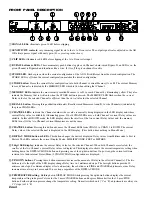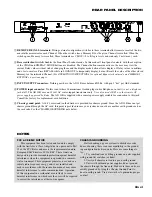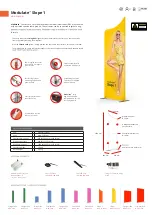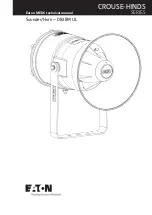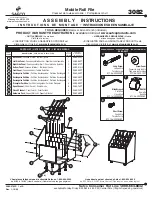
Manual-1
OPERATORS MANUAL
AD 22B
AUDIO DELAY
QUICK START
Quickly look around to make sure no one catches you reading this. You’re aware this is the
manual
aren’t you? Wow!
Most people only get about this far in a manual, but there are a few important things you should know about the AD 22B.
So please keep reading. These few points are summarized in this Cliff Note version of the manual.
ADJUSTING SENSITIVITY.
First apply a signal with nominal input level and adjust the SENSITIVITY controls so
the red CLIP LEDs just light, then back off so the LEDs do not turn on, even with high signal peaks.
SETTING DELAY.
Now that the input signal is calibrated, press the CHAN button until the CHAN LEDs indicate the
Channel you want to set. We cover the special case of adjusting
both
Channels simultaneously later (both CHAN LEDs
on
).
Adjust the up/down buttons until the LED display shows the desired Delay. To adjust the Delay of the other Channel press
the CHAN button until the other Channel’s LED is lit, and adjust the Delay as before.
STORING DELAY.
Press the STORE button (the STORE LED stops flashing). This stores the current Delay values
into each Channel’s current Memory (A or B). The current Memory for each Channel is indicated by the MEMORY LED
lit when editing that Channel. Both Channel's current Delay values are stored with each press of the STORE button.
RECALLING DELAY.
To recall a stored Memory, press RECALL. Each press of this button alternately recalls stored
Memories (A then B then A…) for the selected Channel only.
A quick way to recall Memories into both Channels simultaneously, is to store both Channel’s values into the same
Memory. With
both
Channels selected (both CHAN LEDs
on
), press RECALL to restore
both
Channel’s Memories at the
same time.
SETTING TEMPERATURE.
The AD 22B is factory set for 22°C/71.6°F. To change this, press and hold DISPLAY
MODE and press one of the up/down buttons. Use the 1ms/COARSE buttons for degrees Celsius or the 10µs/FINE buttons
for degrees Fahrenheit. The LED display shows the temperature setting. Further pressing of the up/down buttons adjusts the
temperature setting. This temperature is used, with constant 30% humidity, to calculate the speed of sound for converting
delay times into distance.
Never connect anything except an approved Rane power supply to the red thing that looks like supply to the red thing
that looks like a telephone jack on the rear of the unit.
This is an AC input and requires special attention if you do not have
a power supply
exactly
like the one originally packed with your unit. See the full explanation of the power supply require-
ments elsewhere in this manual.
Note: It is normal to hear harmless short bursts of stored data playback when recalling a memory. Also, powering up
the AD 22B without input signal eliminates chirping that may occur when scrolling delay values.
AD 22B CONNECTION
When connecting the AD 22B to other components in
your system for the first time,
leave the power supply for last
.
This gives you a chance to make mistakes and correct them
before any damage is done to your fragile speakers, head-
phones, ears, or brains. The AD 22B passes audio while it is
unpowered by virtue of its fail safe bypass relays (when the
AD 22B functions as a wire).
Turn the system volume down
before plugging in the AD 22B’s power.
INPUTS AND OUTPUTS
The AD 22B’s Inputs and Outputs are electronically
balanced, so use only balanced wiring. The AD 22B’s shields
(pin 1) connect to
chassis ground. Pin 2 is “hot” per AES
standards.
REMOTE RECALL TERMINALS
Each channel of the AD 22B has two nonvolatile Memo-
ries, “A” and “B”. Connecting a switch between the GND and
CH1 or CH2 terminals permits recalling the Memories
remotely. Only a change in the switch position is sensed—
when the switch closes, Memory B for the given Channel is
recalled. When the switch opens, Memory A is recalled.
Connecting the two Channel terminals (CH1 & CH2) together
on one side of the same switch, permits stereo recall of
Memories A and B.
WEAR PARTS:
This product contains no wear parts.


